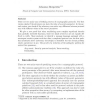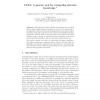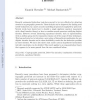22 search results - page 2 / 5 » Deciding Knowledge in Security Protocols under (Many More) E... |
ENTCS
2006
13 years 5 months ago
2006
There are two main ways of defining secrecy of cryptographic protocols. The first version checks if the adversary can learn the value of a secret parameter. In the second version,...
CCS
2005
ACM
13 years 11 months ago
2005
ACM
We provide an effective procedure for deciding the existence of off-line guessing attacks on security protocols, for a bounded number of sessions. The procedure consists of a co...
RTA
2009
Springer
13 years 12 months ago
2009
Springer
Reasoning about the knowledge of an attacker is a necessary step in many formal analyses of security protocols. In the framework of the applied pi calculus, as in similar languages...
CORR
2010
Springer
13 years 5 months ago
2010
Springer
In this paper, we prove that type-tagging prevents type-flaw attacks on security protocols that use the Exclusive-OR operator as our main contribution. Our proof method is general ...
IANDC
2008
13 years 5 months ago
2008
Recently automated deduction tools have proved to be very effective for detecting attacks on cryptographic protocols. These analysis can be improved, for finding more subtle weakn...



